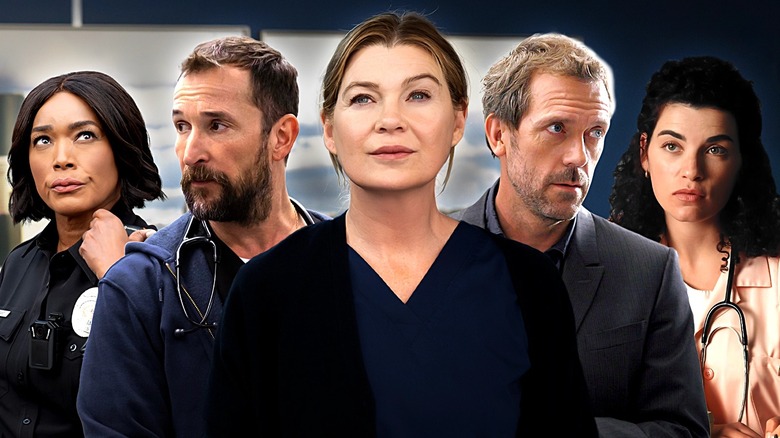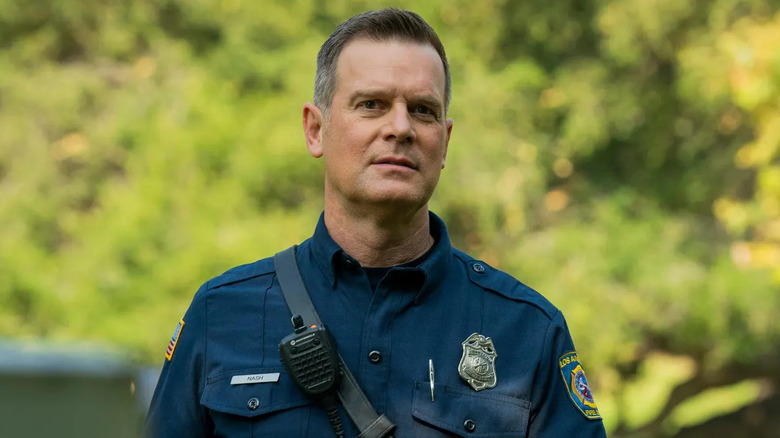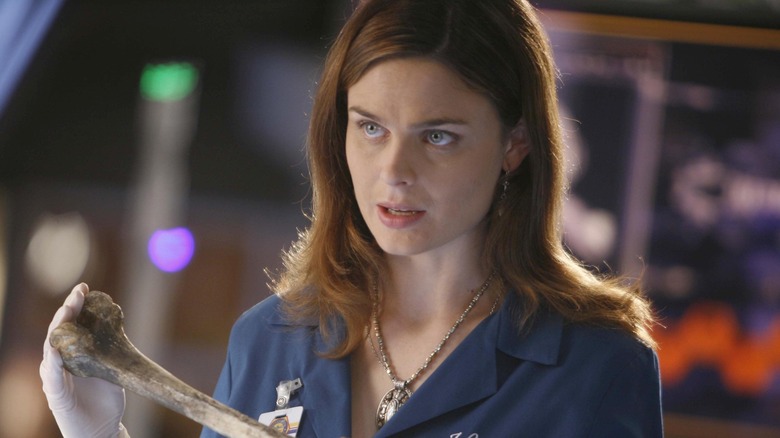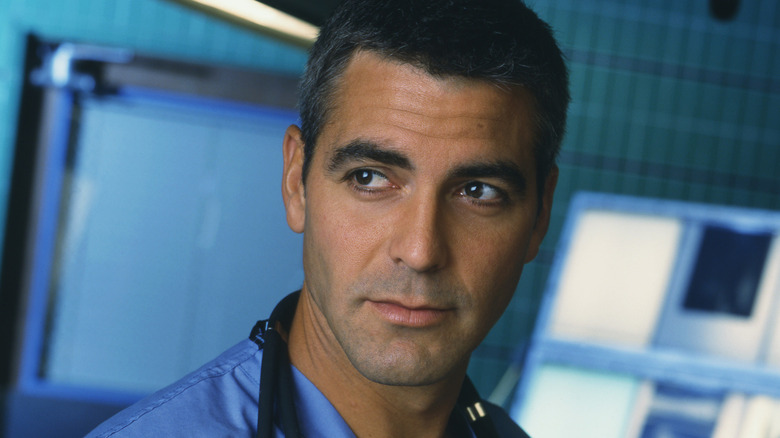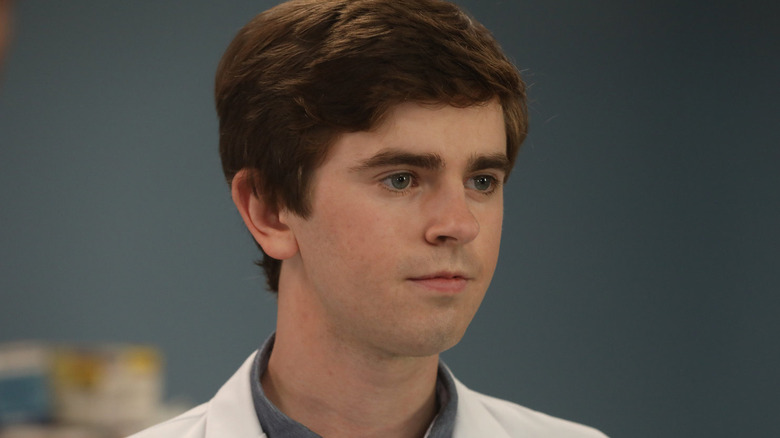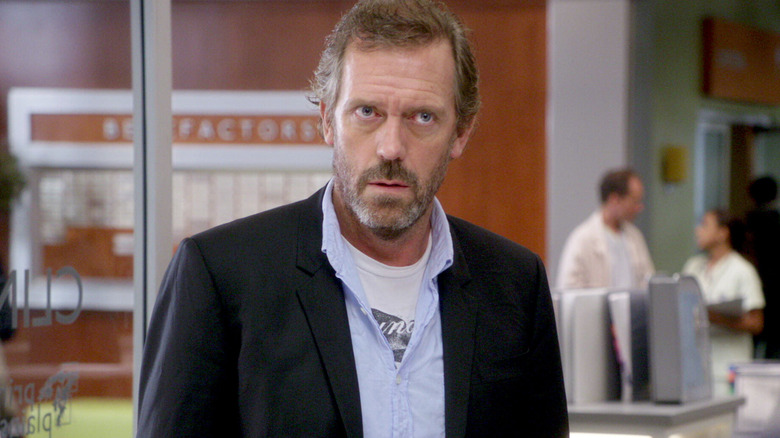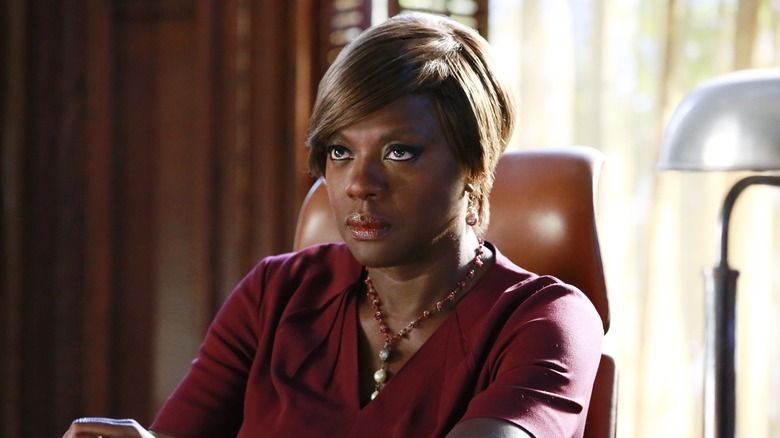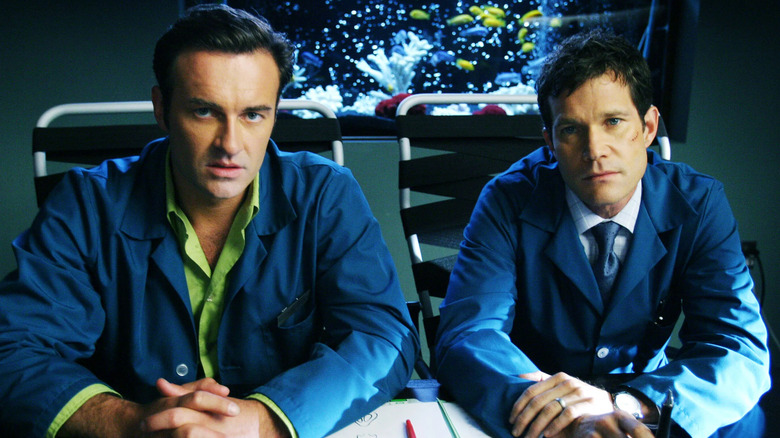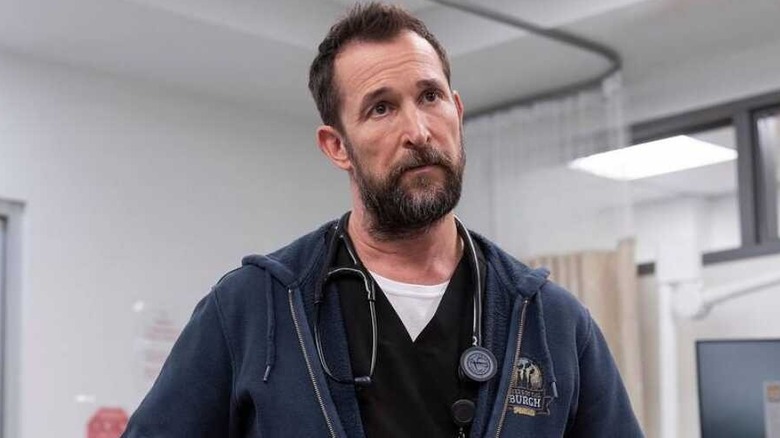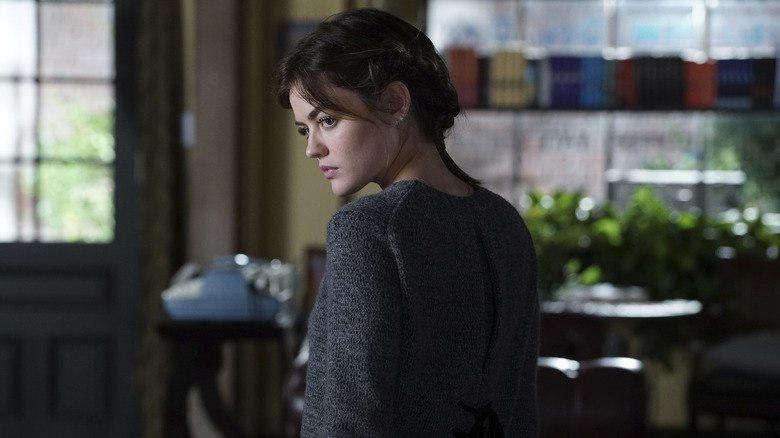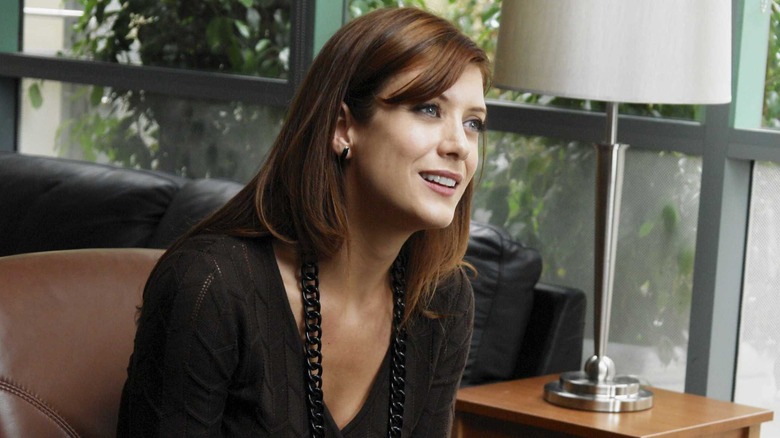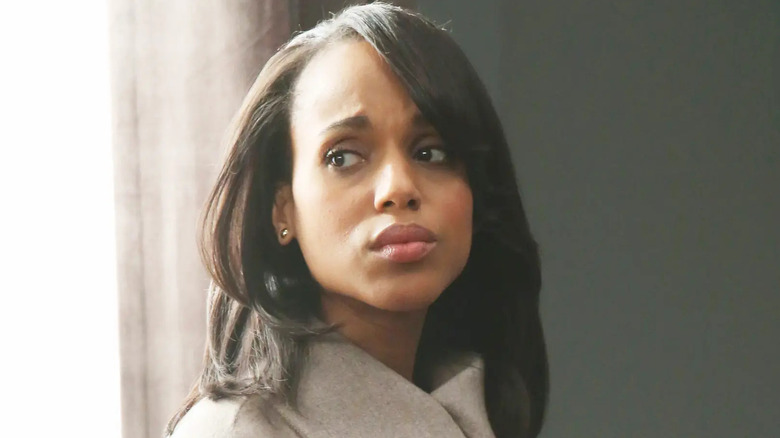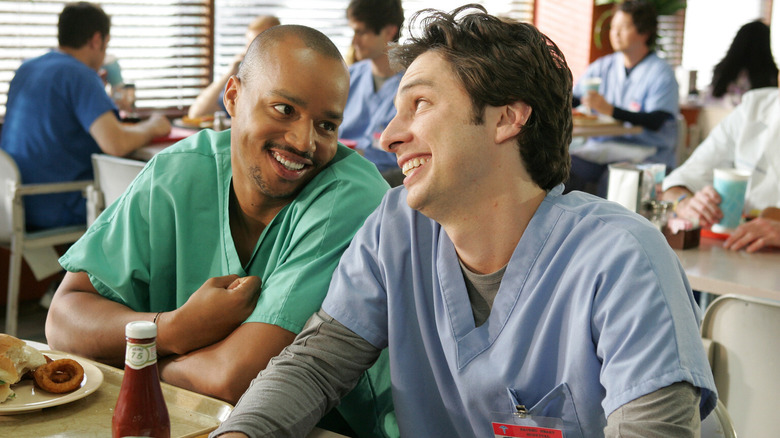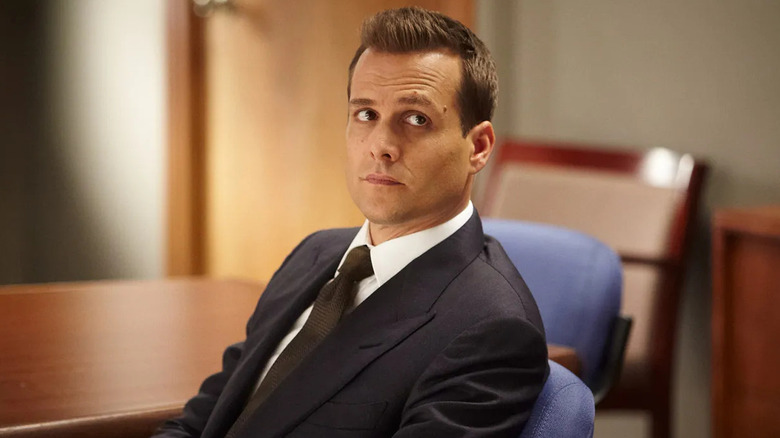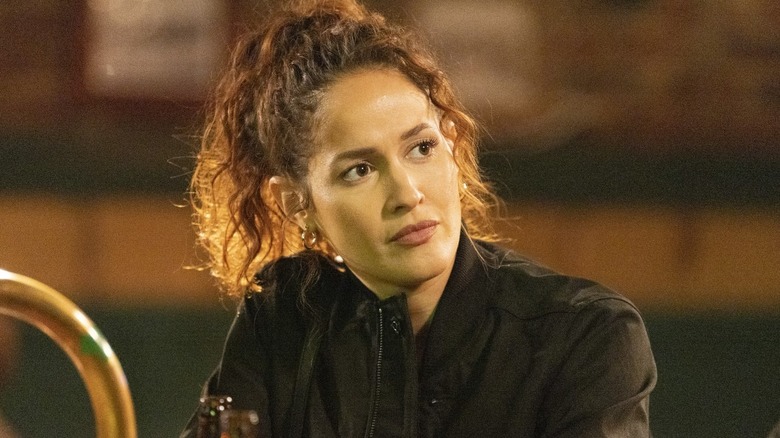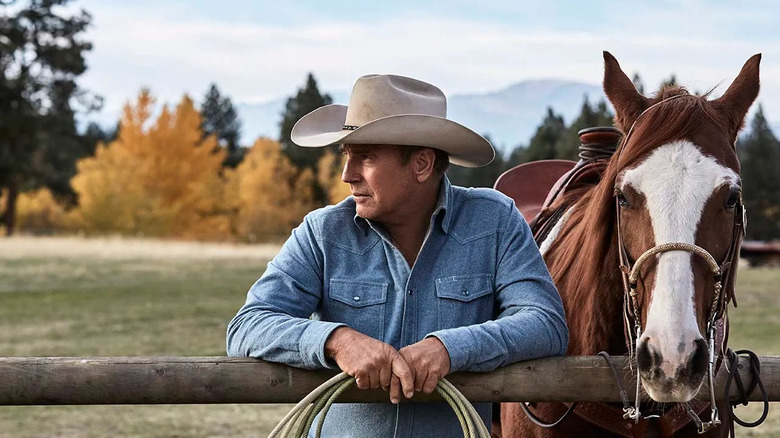15 Best TV Shows Like Grey's Anatomy
Since 2005, "Grey's Anatomy" has captivated an astoundingly broad and enduring audience that can't be denied. Despite its seemingly restrictive setting and genre, it has something to offer everyone — those thrilled by the functions of a busy hospital; fans of melodramatic reveals and romances, as well as those invested in mature relationships; and especially those who want hundreds of high-quality episodes to keep them company as they grow into the next season of their life.
And yet, despite how culturally relevant the series has remained for over two decades, it's this unique combination of subgenres and styles that makes "Grey's Anatomy" one of the more difficult shows for us to offer recommendations for. Sure, it would be easy enough to toss out 15 of the most popular medical procedurals out there and call it a day — but we know we can do better. As such, we've gathered a mix of twisty, scandalous romantic dramas, snappy procedurals with high episode counts, and those medical shows that are actually worth picking, choosing, and loving.
9-1-1
Aside from "Grey's Anatomy," there isn't a procedural out there as unpredictable and over-the-top as "9-1-1." Originally released on Fox in 2018 (before being canceled and jumping over to ABC in 2024, where it continues to air as of writing), the series follows Los Angeles first responders — primarily the firefighters of LA Fire Department Station 118 — as they set out to meet the city's most dangerous and unexpected disasters.
"9-1-1" deserves credit for twisting the procedural format ever so slightly by including a broader range of roles within the first responder community compared to a show like "Grey's," the ensemble of which comes exclusively from a single hospital. On a daily basis, Station Captain Bobby Nash (Peter Krause) collaborates with L.A. Police Department Sergeant Athena Grant (Angela Bassett), paramedics Henrietta Wilson (Aisha Hinds) and Howard Han (Kenneth Choi), and — at least in the 1st season — 911 dispatcher Abby Clark (Connie Britton).
What fans of "Grey's" will be especially drawn to is its endless parade of shocking yet vaguely realistic emergency scenarios. Co-creator Ryan Murphy leaves little to the imagination and spares even less of his own, twisted reserve to horrify and excite viewers with real-world dangers, which further embellishes the escapist fantasy of everyday heroism that drives "9-1-1." And if you enjoy the mothership series, there are two spin-offs already for you to binge as well.
Bones
For many viewers, suddenly swapping out the cold fluorescent atmosphere of the Grey Sloan Memorial Hospital in Seattle for the open skies and sun-soaked streets of Los Angeles might be a bit jarring. Fortunately, a change in premise doesn't always have to mean a change of scene.
On "Bones" — an excellent crime procedural-slash-romantic dramedy that aired for 12 seasons on Fox — the majority of the action takes place in a crime lab that feels like a close relative to a hospital. It follows Dr. Temperance "Bones" Brennan (Emily Deschanel), an anthropologist who is able to discern key details about open murder cases by studying the bones of victims. She is so singularly skilled in helping the FBI catch criminals who would otherwise manage to escape that she has a direct partnership with one of the bureau's top operators — David Boreanaz's Special Agent Seeley Booth.
Admittedly, there are some aspects of "Bones" that make no sense, as well as a few episodes that fans won't watch more than once. Otherwise, the balance between the playful interpersonal drama of the lab and the thrilling intrigue of the crimes themselves creates an atmosphere perfect for fans of "Grey's Anatomy."
ER
What if you aren't ready to leave the on-call room just yet? In that case, if you loved "Grey's Anatomy" that much, it might be time to give one of television's longest-running and most influential medical dramas a try.
First premiering on NBC in 1994, "ER" began its life as a collaboration between entertainment titans Michael Crichton and Steven Spielberg, based on a spec script the former had penned all the way back in the '70s. Though Spielberg ultimately dropped out, leaving Crichton the sole creator of one of the most successful TV shows of all time, there remains a distinct patina of high-quality storytelling and execution that still makes "ER" an outlier among an endless sea of interchangeable medical procedurals.
Of course, in addition to the rotating roster of writers and directors (which included Quentin Tarantino), the series owes much of its success to its remarkable ensemble cast, famously anchored by a young George Clooney, prior to his meteoric rise as a film actor. In addition to Clooney, "ER" also featured Noah Wyle in a prominent role — one that would eventually lead to a failed "ER" reboot and the birth of arguably the greatest modern medical drama currently on TV.
The Good Doctor
Based on the 2013 K-drama of the same name, "The Good Doctor" is a medical procedural with a key twist to distinguish itself from the likes of "ER" and "Grey's Anatomy." Rather than following an ensemble of doctors with fascinating but relatively average personal struggles, the ABC series for David Shore and Liz Friedman explores the experience of a surgical resident who has been diagnosed with autism spectrum disorder (ASD).
Freddie Highmore stars as Dr. Shaun Murphy, the resident in question, whose disorder is depicted as directly impacting his career as a surgeon. While he has some difficulty reading social cues and communicating with patients and staff, he is also a savant and a uniquely effective medical practitioner. Suffice it to say, opinions are very mixed concerning the accuracy and responsibility of the show's portrayal of those living with ASD. That being said, "The Good Doctor" is a well-written medical drama with a solid cast that will surely entertain fans of "Grey's Anatomy."
House
For those already aware of "The Good Doctor" who might be inclined to avoid it in favor of something with a little more bite, we'd easily and enthusiastically recommend "House." Essentially the diametric opposite of the former series, the long-running Fox program combines elements of the procedural format, serialized storytelling, dark comedy, and even the detective mystery subgenre to create a medical drama unlike anything airing at the time.
Hugh Laurie gives a career-defining performance as Dr. Gregory House, a character with a similar sort of TV-neurodivergence that grants him some special skills in the workplace, but leans so far toward the antisocial end of the spectrum that he's more likely a pathological narcissist and/or high-functioning sociopath than anything else. His photographic memory and elastic, encyclopedic knowledge of medicine — as well as his extraordinary ability to imagine new or unconventional ways with which it can be applied — are constrained by his need to intellectually and psychologically dominate everyone around him, including his ailing patients.
Laurie's performance is so charmingly acerbic that the series can play all of this for laughs and thrills. And when he is occasionally held accountable for his questionable actions, "House" creates some of its best moments overall.
How to Get Away with Murder
Of course, if one is unsatisfied by or already finished with the medical dramas recommended thus far, yet finds themself still apprehensive about venturing outside the subgenre, there is no safer option than considering another show from within the ever-expanding Shondaland. They don't all share the same continuity, but rather the flavor of characters and storylines we've come to expect from Shonda Rhimes.
Take "How to Get Away with Murder," for example. While the classrooms and courtrooms of this ingenious hybrid of legal drama and crime thriller create stories far from what you'd see on "Grey's Anatomy," the Shondaland signature is obvious and ever so comforting in every episode. Without spoiling the twists and turns of this series — which begin almost immediately after Viola Davis' Annalise Keating welcomes her class of would-be lawyers to their first lecture — its reveals, romantic intrigue, and web of stories resembles the best overarching plots of "Grey's Anatomy," but with a focus that fans of prestige television will absolutely die for.
Nip/Tuck
"9-1-1" isn't the only Ryan Murphy series "Grey's Anatomy" fans will love. In fact, this one might be an even more perfect match — before the prolific TV creator and producer began dominating the world of small-screen horror, he made a name for himself with a grisly medical drama that helped usher in the dawn of the Golden Age of Television.
Dylan Walsh ("Superman and Lois") and the late Julian McMahon (the Doctor Doom of the early-2000s "Fantastic Four" film series) star as doctors Sean McNamara and Christian Troy respectively, two of the most sought-after cosmetic surgeons in the world, whose white-glove practice in Miami, Florida, is secretly a hotbed of sex, infidelity, and manipulation. In both their personal and professional lives, these almost fraternally bound geniuses practice on the razor's edge, always in danger of letting their egos and libidos drag them into the depths of total moral abnegation. It's a dark series, almost as punishing and disturbing as it is arrestingly seductive.
The Pitt
When it was made public in 2005 that Noah Wyle would be departing "ER" and exiting a privileged position as one of the stars of what was then the longest-running medical drama in TV history (a record that has since been overtaken by "Grey's Anatomy"), many were left scratching their heads. Why would an actor take such a gamble on their career? Little did anyone know that 20 years later, Wyle would return to the subgenre in full force, executive producing the acclaimed HBO Max series "The Pitt" alongside R. Scott Gemmill and John Wells, both of whom worked with Wyle on "ER."
Inspired by the incredible burden shouldered by the medical community during the COVID-19 pandemic, "The Pitt" follows the emergency room staff at an overwhelmed Pittsburgh trauma facility through a single 15-hour shift played out in real time. Think "Grey's Anatomy" meets "24." Fans of Wyle's work on "ER" will be especially pleased (so much so that Michael Crichton's estate is suing the show), but even those less attuned to the medical subgenre will be utterly captivated by its relentless pace and powerful performances.
Pretty Little Liars
Hold on, HOLD ON. Just hear us out.
As we said, the audience for a show like "Grey's Anatomy" is incredibly diverse, with the series' ability to satisfy such a variety of TV interests being key to its enduring success. Undoubtedly, there are some fans who are less interested in the procedural aspect of the series, but stick around for the rich character drama, romantic intrigue, and the many twists and reveals that manage to be so shocking that they almost strain one's suspension of disbelief. Yet, in that amusingly earnest way, such shows keep you hanging on every scene.
If that's why you watch "Grey's Anatomy," then you'd honestly have better luck finding a satisfying follow-up in a show like "Pretty Little Liars" than any medical procedural we could possibly list off. A quietly influential teen crime drama, the fingerprints of which are undeniably present on shows like Netflix's "You" or even "The Outer Banks," it follows a group of high schoolers whose lives are manipulated by an unseen voyeur blackmailing them with secrets only their missing best friend could know. It's a truly wild series best begun having as little foreknowledge and as much of that suspension of disbelief as possible.
Private Practice
Given that Shonda Rhimes and ABC were fairly protective of potential "Grey's Anatomy" spin-offs, it's almost surprising that we got "Private Practice" at all. It premiered in 2007, just over two years after the mothership series premiered, and was written entirely around Kate Walsh's Dr. Addison Montgomery.
Having failed to rebuild her relationship with her ex-husband Derek Shepherd (Patrick Dempsey) and suffered heartbreak at the cold hands of Alex Karev (Justin Chambers), all while serving as Chief of the OB/GYN department at Seattle Grace, mind you, the spin-off begins with Addison moving out to Los Angeles to work in a private practice. Here, she has to immediately navigate a harsh personal environment, as well as a professional environment that essentially operates in opposition to the hospitals she's used to.
If you've just started watching "Grey's Anatomy," there's actually a way you can watch "Private Practice" so it best weaves into your viewing experience. Otherwise, it's a compelling drama on its own, striking the perfect balance between novelty and familiarity.
Scandal
In our opinion, "Scandal" is the best Shonda Rhimes show aside from "Grey's Anatomy," and is 100% a must-watch for anyone in love with the latter drama. Kerry Washington stars as Olivia Pope, a former presidential campaign manager who now runs a lean but effective crisis management firm. Handling scandals of all sizes for America's most powerful individuals, there's one scandal Olivia can't seem to bury for good — her secret love affair with the sitting president of the United States of America (played by Tony Goldwyn).
"Scandal" is far more serialized than a procedural like "Grey's Anatomy," and may require closer viewing to pick up on all the subtle misdirects and clues that surround its thrilling, mystery-driven storylines. Its view of Washington politics is caught somewhere between "The West Wing" and "House of Cards," openly engaging with conspiratorial ideas and portraying power as something obtained by rational people with wildly varying moral codes.
Scrubs
Though it may not seem like it at first, "Grey's Anatomy" actually has more in common with the political thriller "Scandal" than it does "Scrubs," despite both of them being procedurals set in hospitals. And yet, the differences between the two shows may just be the reason why some will find it to be the perfect follow-up series after "Grey's."
"Scrubs" is essentially an absurd workplace sitcom (though closer in tone and style to "Ally McBeal" or "Community" than "The Office") disguised as a medical procedural. Picking up with a class of interns at Sacred Heart Hospital, it explores similar storylines to "Grey's Anatomy" with unexpectedly weird execution. At the same time, creator Bill Lawrence (now best known for the Apple TV+ dramedy "Ted Lasso") knows when and how to provoke genuine heartbreak with a dose of reality from the medical world. As of writing, there's a planned revival of the series that sounds eerily close to "The Pitt."
Suits
For another slick, long-running procedural you can either focus on or throw on in the background for comfort, there's no better option than "Suits." Admittedly a bit "bro-y-er" than "Grey's Anatomy," its snappy dialogue, ridiculously twisted storylines, and mixture of self-serious legal drama and workplace comedy are so distinct that those inclined to enjoy it will be hooked right away (and everyone else will know fairly quickly if it's not for them).
"Suits" is largely the story of Mike Ross (Patrick J. Adams), a gifted but recently expelled law student who sustains a waking nightmare of underachievement by getting high and passing the bar for rich kids too lazy to study for his dream job. When a close shave with the law miraculously results in him encountering morally-flexible corporate attorney Harvey Specter (Gabriel Macht), he finds an unlikely mentor — and even more unlikely employer. As the pair work together, combining Harvey's unstoppable legal mind and Mike's photographic memory, they must constantly evade the prying eyes of Harvey's rivals, who would have him fired and Mike imprisoned should they ever learn the latter never graduated from Harvard Law. (And if you watch long enough, you'll eventually get to see Katherine Heigl in one of her first major TV roles since "Grey's.")
Station 19
If you're looking for a series that is almost exactly like "Grey's Anatomy," then you don't need to look much further than "Station 19." The most recent spin-off of "Grey's," it has basically all the same narrative tropes, but wrapped up in a fire department three blocks down the road from Grey Sloan Memorial.
Though Dr. Ben Warren (Jason George) is part of the series' main cast, it primarily follows Jaina Lee Ortiz ("Rosewood") as Andy Herrera, one of Station 19's acting captains. When her father, the previous captain, nearly dies in the middle of a fire, Andy steps up to lead the station alongside Grey Damon's star-fighter Jack Gibson — who just so happens to be Andy's secret ex-lover. Much of the first season revolves around Andy's attempts to manage her father's declining health, her split feelings for Jack and a Seattle police officer, and her struggle to keep herself together so that she can prove herself as the leader Station 19 needs.
Yellowstone
Similarly to "Pretty Little Liars," "Yellowstone" is an unlikely pairing with "Grey's Anatomy" that undeniably shares so much in common with the latter series that it just might make sense. A spiritual successor to the classic soap opera "Dallas" as well as a melodramatic, Western riff on a contemporary prestige corporate drama like "Succession," the Taylor Sheridan series explores how a wealthy ranching dynasty — as capable and dangerous in wielding political pressure as they are guns and lassos — protects their way of life against threats hailing from centuries in the future and past. Caught between large corporations and an influential indigenous community, both of whom desire the land upon which the Yellowstone Ranch was built, the Duttons are in a constant state of existential danger.
The Duttons are not admirable protagonists like the doctors of "Grey's" (by the series' end, you're rooting for most of them to die), and the show's serialized storytelling opposes the episodic procedural format. But the wildest moments of "Yellowstone" rival those seen on the ABC series, and the romance is just as, if not more, salacious. With seasons upon seasons of spin-offs available to stream, it's perhaps the only contemporary drama that can provide the same consistent stream of thrills and intrigue as "Grey's Anatomy."
